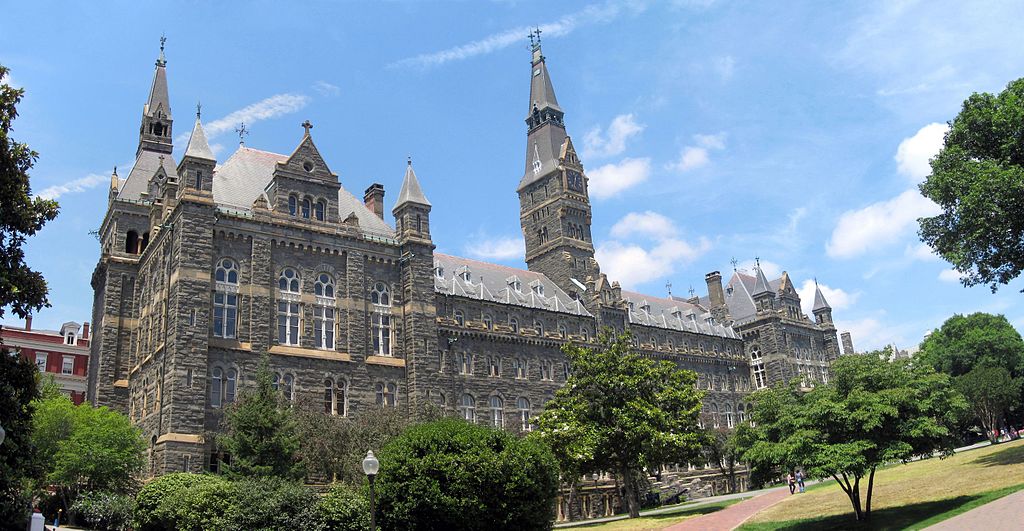The Georgetown Prison Divestment Campaign (GUPDC) crafted and sent a proposal demanding the university divest from the prison industrial complex sent to the university’s Committee on Investments and Social Responsibility (CISR) in early August. This followed the release of a petition to the student body on Aug. 3.
The newly-formed organization started up in the wake of nationwide focus on criminal justice and the prison industrial complex, which disproportionately affects Black Americans. Cecily Burge (COL ‘21), Abigail Lovell (COL ’21), Rachel Klein (SFS ’24), and Chloe Quigley (COL ’21) have taken the lead of the organization, among others.
“We live in a world where we habitually forget to ask what we owe our most vulnerable citizens,” Burge wrote in a statement to the Voice. “In America, poverty and race too often determine legal fate. Wealth and whiteness are equated with innocence and imprisonment is understood as a solution to deeply rooted economic, social, and political problems.”
To this end, the team of students is mounting a campaign focused on pushing Georgetown to divest from the prison-industrial complex.
The prison-industrial complex is a term coined in the 1970s, referring to the privatization of prisons, and a newfound focus on profits, instead of rehabilitation. This has caused disproportionate harm in many minority communities, the team pointed out.
“To date, the American prison system confines 2.3 million people and looms over another 840,000 people on parole and 3.6 million people on probation,” the proposal reads. “ Of these people, 40% are Black, though Black Americans only account for 13% of the total US population. This makes Black Americans more than five times more vulnerable to incarceration than white Americans. It follows, then, that Black Americans are also exploited by the prison-industrial complex at much higher rates than white Americans.”
Georgetown is complicit in this system by investing in companies that generate profits due to private prisons, or take advantage of prison labor, GUPCD argues. They have flagged Aramark, the main food distributor on campus, as one of these companies. While the team does not see divestment as the final solution to the privatization of prisons, they have identified it as a concrete step universities can take.
“First, it is important to emphasize that we understand that divesting will not ‘solve’ the prison-industrial complex, and there is no ‘quick fix’ for a system as complicated and deeply rooted in our society as this one. However, we firmly believe that divestment is a critically important first step, to be followed by many others,” Klein wrote in a statement to the Voice.
The five main asks of the plan sent to CISR are: (1) compile a report on the progress of Georgetown’s 2017 commitment to divest from private prisons, (2) divest from companies that use unpaid and/or cruel and exploitative prison labor in their supply chains, (3) divest from companies with monopolies or business contracts that control prison necessities such as phone lines, food, health care and commissary items, (4) require all future investments to be in companies that employ fair chance hiring practices, and not take advantage of the prison “employment” system, and (5) advocate, through shareholder resolutions and other tactics, for policies within companies and within Georgetown itself that help reduce recidivism rates and create criminal justice reform.
Georgetown students have successfully worked with CISR before to reform Georgetown’s investment policy. Georgetown Fossil Fuel (GUFF) pushed the administration to divest from the fossil fuel industry last year. Quigley said that one of their first calls was to a GUFF team member, but divesting from the prison industrial complex represents a different challenge.
“The PIC is embedded in thousands of companies and generates only some profits. Prison labor is a part of many large companies but only a small fraction of their profit generation,” Quigley wrote. “Because of this, we have to create a list of credentials that define when it is time for GU to divest and when it is time for GU to advocate and engage.”
The GUPDC team believes that Georgetown can be an example to other schools when it comes to prison divestment.
“GU divesting is just part of what we are working toward,” Quigley added in a statement to the Voice. “We are collaborating with other schools that have similar campaigns and we know that when one school moves, the rest will follow.”
The leaders of GUPDC understood that simply sending a proposal to CISR would not be enough to create change. So, Quigley and the team began a spirited social media campaign centered around a student petition in order to gain support, which they feel has been a rousing success.
“It has also allowed us to engage with students and alumni. Our team has multiplied since our petition went live. We are getting constant feedback on our social media,” Quigley wrote. “The petition is just a first step. Dialogue is absolutely necessary and we look forward to having that conversation with CISR.”
The petition is not the only method GUPCD has used to disseminate information. The team has been active on social media, sharing information and resources, as well as providing users with content they can share with their own networks.
As of Aug. 16, over 600 students and 23 organizations have signed on to the petition, and countless members of the community have shared GUPDC resources on social media.
The use of a petition has allowed many students to quickly voice their support for this issue. However, the team is aware of potential drawbacks to the approach, and concerned students will not continue their engagement with the issue after they sign the petition.
“Petitions–especially online petitions–can lead to a sort of one-and-done activism sometimes called ‘clicktivism,’” Lovell wrote in a statement to the Voice. “In the fast-paced, transitory world of social media, people can feel enraged, commit to act, and then take action all in the span of two minutes. After signing a petition, which we often see as a tangible step toward change, people feel as if they’ve done something, then congratulate themselves on their action and wash their hands of the issue.”
To keep students engaged, GUPCD has been providing educational content, often shaped by authors such as Ta-Nehisi Coates, Angela Davis, and Arthur Waskow.
“Our campaign draws from national discourse because, on a personal level, each of our team members are inspired by leading prison abolitionists,” Klein wrote. “Ta-Nehisi Coates’ and Angela Davis’ writing often inspire the educational content we post. The language they use regarding the PIC and the way in which they articulate prison abolition arguments help us frame our own research and writing.”
This initiative is only the first step GUPCD hopes to see from Georgetown to actualize its commitment to racial justice. It is assuredly not the only step.
“Georgetown’s statements about anti-racism, diversity, and inclusion in the classroom hold little weight when our endowment is directly invested in the PIC— a system that upholds and affirms other subsystems (racial profiling, school-to-prison pipeline, prison labor, cash bail, etc) that are fundamentally rooted in deepseeded racism,” Klein wrote.
Klein, an incoming freshman, has quickly become a key member of the GUPCD team, despite having never stepped foot on the Hilltop as a student. Yet, the culture of GUPCD has been one that has given many an opportunity to lead and try to create meaningful change no matter how long they have been on campus, she reported.
“I have always wanted to get involved with something related to criminal justice, prison reform, or policing at Georgetown and I thought the campaign would be the perfect opportunity to begin advocacy work on campus, especially because the campaign is not just a call to action within the Georgetown community, but also is representative of a larger movement I want to be a part of,” Klein wrote.
As the team waits to see how CISR and the Georgetown administration respond to their proposal, they have kept their eyes on the future after divestment and outside of Georgetown.
“Abolition––and not reform––will be our only solution to fixing the problem of the prison industrial complex. Reform, by nature, is unrevolutionary. It is impossible to truly change a justice system for the better without altering the institutional structures, communities, and politics that inform it,” Burge wrote.
“This entails ending the habitual plundering of Black bodies and waging war against the unholy marriage of capitalism and white supremacy. It means reckoning with the moral debt that America has accrued and asking what is owed to the citizens this country has forced into irreparable vulnerability.”








[…] alumni to sever ties with the food services company. We have seen students at Princeton University, Georgetown University, and even Carleton University in Canada demand that their institutions divest from the prison […]